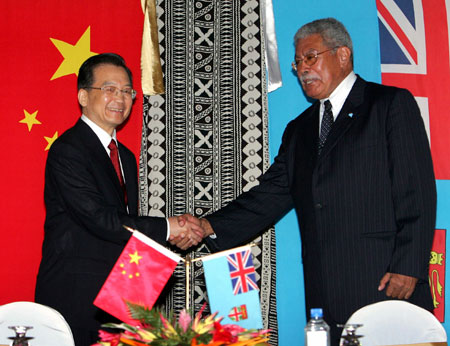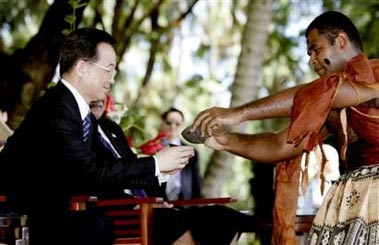Chinese Premier Wen Jiabao has announced a new package of aid to Pacific
countries to develop bilateral relationships and to revitalize
cooperation in the economic field.
|

Fijian Prime Minister Laisenia Qarase (R) shakes hands with Chinese
Premier Wen Jiabao after a signing ceremony in Nadi, Fiji April 4, 2006
for bilateral agreements between the two countries. [Reuters]
|
Wen offered new loans and aid and promised the China was committed to long
term engagement with some of the world's smallest and least populated nations.
On the first ever visit by a Chinese premier to the Pacific Islands, Wen told
island leaders and ministers at the opening of an economic and development
conference that China was in the region to stay.
"As far as China is concerned, to foster freindship and cooperation with the
Pacific island countries is not a diplomatic expediency," Wen told the opening
of the China-Pacific Islands Countries Economic Development and Cooperation
conference.
"Rather it is a strategic decision. China has proved and will continue to
prove itself a sincere, trustworthy and reliable friend and partner of the
Pacific island countries forever."
Wen emphasised the prospect of growing economic links between China and
the Pacific Islands during his flying 23-hour visit.
"Our respective economies are mutually complementary. China has funding and
technical expertise. The island countries are rich in natural resources," he
said.
Wen announced China would provide three billion yuan (US$375 million) in
preferential loans in the next three years to boost cooperation in resources
development, agriculture, fisheries and other key industries.
|

Chinese Premier Wen Jiabao (left) is offered a traditional drink of
Kava during a traditional Fijian welcome in the city of Nadi, Fiji,
Wednesday, April 5, 2006. Wen attended the China-Pacific Countries
Economic Development Forum and meet with many Island country leaders,
including Fiji's President Ratu Josefa Iloilo and Prime Minister Laisenia
Qarase. [AP Photo]
|
China would also offer zero tariffs for exports from the least developed
countries in the region, as well as cancelling any of their debts which matured
at the end of 2005.
He also announced free anti-malaria medicines would be provided to affected
Pacific countries over the next three years and training for 2,000 government
officials and technical staff.
Wen witnessed the signing of bilateral agreements with eight island countries
during his stopover at Denarau. Ministers also signed a regional framework
agreement for economic cooperation between China and
the Pacific nations.
The visit saw dark suited Chinese and Pacific officials mixing with a horde
of security officers and tourists wearing shorts and t-shirts in the lobbies of
the hotels used as meeting venues.
Pacific leaders welcomed the visit as an historic event and Fiji Prime
Minister Laisenia Qarase said it reflected shifting diplomacy and political
realignments in the region.
He said China had emerged as a major presence in international affairs and a
powerful and vital force in the Pacific.
"For the island countries, traditional trade and diplomatic ties with bigger
nations remain; some are still strong, some are weakened as strategic interests
and priorities change," he said.
"China defines a new and compelling reality, politically and economically,"
he said.
Qarase said Pacific Island countries wanted to limit or remove their
dependency on aid and this could only happen through increased international
trade.
"We look now for new markets, where there is flexibility of entry and a
readiness to meet the export needs of small, isolated island countries," he
said.
"This is what we would like to engage on with China as we increasingly look
north for the answers to our trade and investment aspirations."
Wen left Fiji late afternoon for New Zealand where he will spend two nights
on his whistlestop tour of the region.